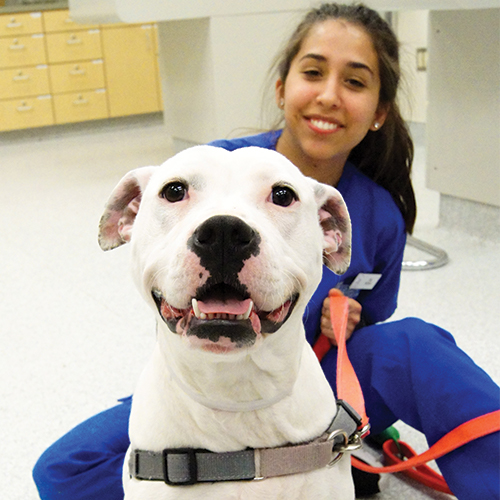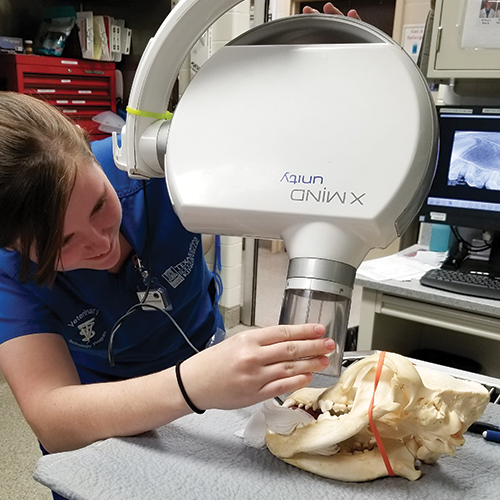Why become a Veterinary Technologist?
Why become a veterinary technologist?
How is it different from a veterinarian?
The Multitasker
Veterinary technologists possess a wide range of skills and have a variety of responsibilities within a veterinary practice. You may see one taking phone calls and scheduling appointments at the reception desk. You may see one taking x-rays of a patient. You may see one bottle feeding an orphaned kitten. You may see one preparing a patient for surgery. You may see one running bloodwork. You may see one cleaning a pet's teeth. You may even see one consoling an owner after the loss of a pet. In general, there are four things (4!) only a veterinarian can do: perform surgery, diagnose a patient, give a prognosis, and prescribe medications. Veterinary technologists can do everything else!
 The Caregiver
The Caregiver
Vet techs are compassionate and caring. When asked why they chose this career field, almost every vet tech will tell you, "because I love animals." Veterinary technicians are the ones who are closest to the patients. They perform the treatments, diagnostic tests, and provide daily care for animals in the hospital. The veterinarians have different responsibilities (like the four mentioned above) that require them to move from patient to patient to make sure all of their needs are met. It is the vet tech's job to follow up and complete all of the treatments the veterinarian would like for the patient. That means the vet techs get all of the snuggle time with the patients (and deal with most of the messy stuff.)
The Educator
Veterinary technologists play an important role in educating others. The education they receive at school can be applied many different ways. Our students learn how disease processes work so they can anticipate the needs of the patient, understand what is happening to them, and be able to troubleshoot any problems that may arise. They serve as a source of information for others working in a clinic. It is also a vet tech's responsibility to educate pet owners about their pets' health. Our students learn about zoonotic diseases (ones that transfer to humans), parasites, and even what to do with a new puppy!
 The Leader
The Leader
Veterinary technologists are more prepared for office management and supervisor positions with the extra courses in the bachelor degree. Our program also incorporates additional animal science courses to prepare our students for careers in production or wildlife medicine. Having a bachelor's degree, as opposed to an associate's degree, opens up more employment opportunities and potentially higher salaries.
Don't stop here! There are opportunities for veterinary technologists to become specialized in an area of medicine. This is similar to a human doctors who focus on treating hands or hearts. These individuals can be identified with the designation "VTS" (Veterinary Technician Specialist) after their names. Candidates for specialty have to meet specific requirements and pass an exam to earn the additional designation in their field. Currently, there are 16 specialties available to veterinary technicians:
- Anesthesia and Analgesia
- Behavior
- Clinical Pathology
- Clinical Practice
- Dentistry
- Dermatology
- Diagnostic Imaging
- Emergency and Critical Care
- Equine Nursing
- Internal Medicine
- Laboratory Animal
- Nutrition
- Ophthalmology
- Physical Rehabilitation
- Surgery
- Zoological Medicine
The National Association of Veterinary Technicians in America (NAVTA) provides more detailed information regarding specialties.
Our program is accredited by the American Veterinary Medical Association (AVMA) as a program for educating veterinary technicians. Our students are eligible to take the Veterinary Technician National Examination (VTNE). In Texas, once one of our students passes the VTNE they will take the state examination to get their license to practice and become a Licensed Veterinary Technologist (LVT).
Veterinary technology is a growing career field with a focus on improving the nursing aspect of animal care. Our mission is to develop well-rounded veterinary technologists with exceptional skills. If your goal is to pursue a career as a Doctor of Veterinary Medicine (DVM), the courses offered during our veterinary technology program will not meet the undergraduate requirements for veterinary school admission. Check out the TAMUK Pre-Veterinary Medicine program for more information on preparing for veterinary school.
Gainful Employment Outlook
The program is designed to take four years to complete. 1.5 years are dedicated to prerequisite courses. 2.5 years are dedicated to veterinary technology courses.
The Bureau of Labor Statistics published a 9% expected increase in jobs from 2024 to 2034 with an estimated 14,300 positions to fill. That's 1,430 veterinary technician positions added per year! As of 2024 Texas is #1 in the nation in employment of veterinary technicians with 16,170 employed.
The national average published by the Bureau of Labor Statistics in 2024 was $22.11 per hour. Salary will depend on credentialing, type of employment, and location. Visit the Bureau of Labor Statistics Occupational Employment and Wages webpage for veterinary technologists here. The Texas average published by the same source in 2024 was $19.11 per hour.
Tuition and Fees:
~$39,568 (VETT 4-year Degree Plan with prerequisites taken as a Texas resident at TAMUK)
Books, Supplies, Transportation:
~$5,400
On-Campus Room and Board:
$4,350 - $6,185 per semester depending on residence hall and meal plan choice.
--------
For more information regarding Tuition & Fees click here.
For more information regarding Campus Housing options click here.
*The amounts shown above include costs for the program assuming normal time completion. Information is subject to change.
